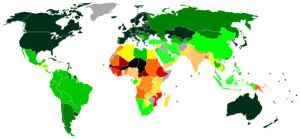 Image via Wikipedia
Image via WikipediaWhat is the point of education? What purpose does it serve to an individual, to the community and to the state?
In its barest essence, education is the ability to read and write in a particular language. By this narrow definition, I am literate in English but a total illiterate in virtually all other languages. Whenever there is talk about the importance of education and statistics are being bandied around regarding literacy levels, it is this narrow definition that most people have in mind. I believe this is unfortunate since education is or should be a much richer picture on a much larger canvas.
At an individual level, education does more than give someone just the ability to read and write. It gives them the ability to think for themselves and not be influenced by the opinion of others. It also teaches how to interact with others socially without causing harm or stress. When viewed like this, education elevates a person to someone who can think things through on their own and in addition gives them analytical tools and abilities. The classic liberal arts education sought to do just this: develop analytical skills while also honing social ones. It is however this characteristic of education that makes it dangerous for elite interests.
A modern economy requires an educated populace. As development proceeds apace and new ways of socializing and working become possible, this requirement only increases. An educated populace is also required to provide a pool of people who can do the R&D that further development of the economy requires. But an educated population is a dangerous one specially if it is also young. Since education gives an individual analytical skills, it also enables them to start questioning the status-quo. Educated people demand a greater say in the ordering of their affairs. Such people are not passive; neither are they likely to be lulled by promises of a better future at the cost of a painful present. If left unchecked, these expectations and passions come out into the open and then become difficult to control. So here is the conundrum. The demands of a modern economy requires an educated population but an educated population demands a greater say in its affairs. Often, elite interests in an economy want the former without the latter. As the events of the last 30 years have shown, elite interests are often different from popular interests.
The solution that seems to have worked so far is to re-define education on a technocratic basis. Emphasize technical aspects while de-emphasizing broader goals. The result is a populace that is largely technically literate but functionally illiterate. Such people can fulfill the demands of the economy while remaining boxed in. At the same time make the box gilded. They beauty of the system is that by and large people will not even realize that they are essentially in a golden cage.

No comments:
Post a Comment